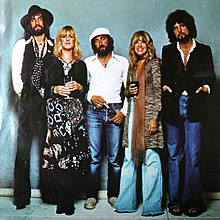
Back Класически рок Bulgarian Rock clàssic Catalan Rock clásico Spanish راک کلاسیک Persian Classic rock Italian クラシック・ロック (ラジオ・フォーマット) Japanese Classic rock Romanian Классический рок Russian Klasický rock Slovak Klasik rock Turkish

Classic rock is a radio format that developed from the album-oriented rock (AOR) format in the early 1980s.[2] In the United States, it comprises rock music ranging generally from the mid-1960s through the mid-1990s,[3][a] primarily focusing on commercially successful blues rock and hard rock popularized in the 1970s AOR format.[2] The radio format became increasingly popular with the baby boomer demographic by the end of the 1990s.[5]
Although classic rock has mostly appealed to adult listeners, music associated with this format received more exposure with younger listeners with the presence of the Internet and digital downloading.[6] Some classic rock stations also play a limited number of current releases which are stylistically consistent with the station's sound, or by heritage acts which are still active and producing new music.[7]
Among academics and historians, classic rock has been discussed as an effort by critics, media, and music establishments to canonize rock music and commodify 1960s Western culture for audiences living in a post-baby boomer economy. The music selected for the format has been identified as predominantly commercially successful songs by white male acts from the Anglosphere, expressing values of Romanticism, self-aggrandizement, and politically undemanding ideologies. It has been associated with the album era (1960s–2000s), particularly the period's early pop/rock music.
- ^ Schube, Will (2021). "40 Bands That Define "Dad Rock"". spin.com.
- ^ a b Pareles, Jon (June 18, 1986). "Oldies on Rise in Album-Rock Radio". The New York Times. Retrieved April 19, 2019.
- ^ Hickey, Walt (July 8, 2014). "Classic Rock Started with the Beatles and Ended with Nirvana". fivethirtyeight.com. ABC News Internet Ventures. Retrieved May 1, 2019.
- ^ Akinfenwa, Jumi (September 14, 2020). "The Rolling Stones, Springsteen ... The Killers: what actually is 'classic rock'?". The Guardian. Retrieved August 5, 2023.
- ^ Leigh, Frederic A. (2011). "Classic Rock Format". In Sterling, Christopher H.; O'Dell, Cary (eds.). The Concise Encyclopedia of American Radio. Routledge. p. 153. ISBN 978-1135176846. Retrieved August 2, 2015.
- ^ Kids are listening to their parents - Their parents' music, that is Archived June 26, 2012, at the Wayback Machine USA Today March 30, 2004
- ^ "New York Radio Guide: Radio Format Guide", NYRadioGuide.com, 2009-01-12, webpage: NYRadio-formats. Archived March 27, 2006, at the Wayback Machine
Cite error: There are <ref group=lower-alpha> tags or {{efn}} templates on this page, but the references will not show without a {{reflist|group=lower-alpha}} template or {{notelist}} template (see the help page).